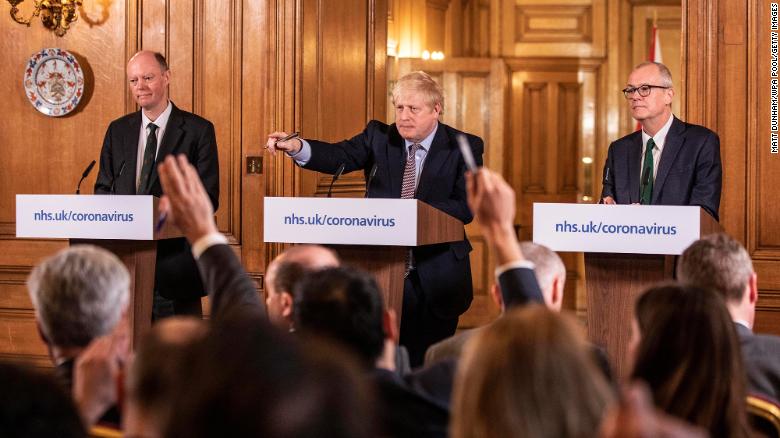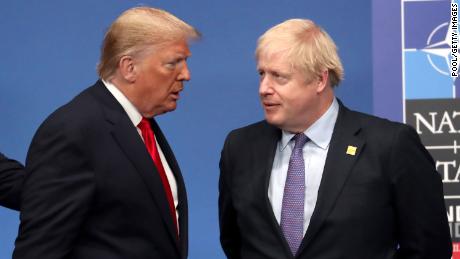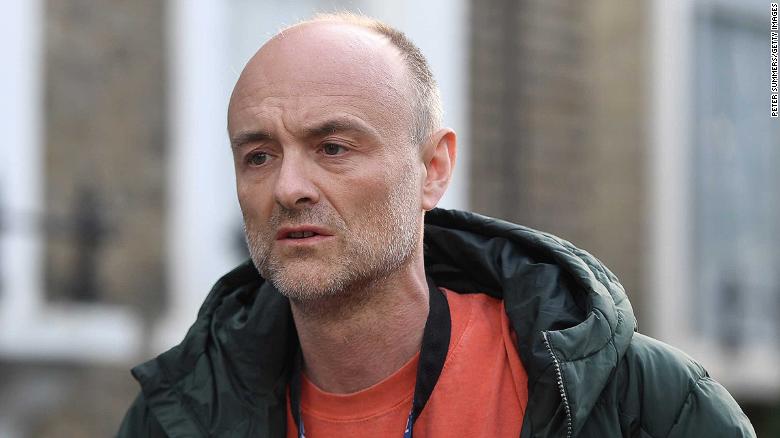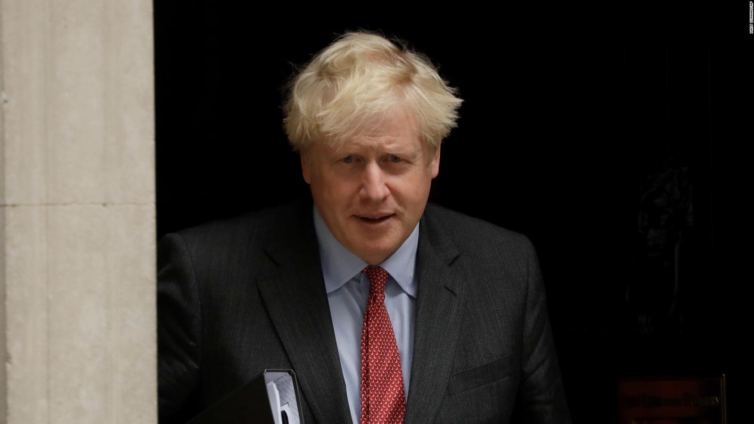It's been another week of difficult headlines for Boris Johnson. Once again, serious questions are being asked of Britain's Prime Minister and his administration's approach to handling the Covid-19 pandemic and, more broadly, the style of government.
Things kicked off with Johnson being criticized for sending mixed messages in a BBC interview on Sunday, in which he warned that coronavirus restrictions could last until 2021, but also that he needed to get the economy moving.
Arguably sending a vague message for a public unsure of what to do as the virus spreads exponentially, he said, "What we want people to do is behave fearlessly but with common sense."
Things got worse, as the government was forced to admit that 16,000 confirmed cases went unreported due to a technical glitch.
Cases are rising in universities just weeks after students returned to campuses: more than 1,000 students at Newcastle University tested positive for Covid-19 over an eight-day period, along with another 770 cases at the University of Northumbria, while three universities in north England have stopped face-to-face teaching.
Concerns about the rise in cases and the testing system were not helped by a cabinet minister having to admit on Wednesday that the country is experiencing supply chain issues with a pharmaceutical company that supplies tests to the UK.

Boris Johnson gives a press conference from 10 Downing Street with his chief scientific adviser and chief medical officer.
And Johnson is under fire from all sides for his approach to introducing further restrictions across the country.
Criticism ranges from decisions on local restrictions being taken in central government by the PM and his close team -- without consulting local leaders -- to curfews not being backed by scientific evidence.
Some in his own Conservative party admit that Johnson wouldn't be their first pick for leader during a pandemic.
"His personal skillset this doesn't play to it. He's not a details, manager type. He's a leader and picture painter," says one veteran Conservative.
"A situation for which there is divided opinion scientifically, politically and changing patterns on how to manage the response is difficult for him."
A former Conservative cabinet minister agrees "he doesn't go into the microscopic detail."
However, they ask, "where's the surprise in that? When Boris was elected to lead this party, we needed someone with a bit of flair who could get Brexit over the line by painting a bigger picture and taking the public with him."
Indeed, Johnson did exactly that when he won a majority in last December's election, breaking the Brexit deadlock that had blighted British politics for years.
And while no one doubts that Johnson and his team that followed him to Downing Street are great campaigners, there's a growing sense that their combative style, led by Johnson's top adviser Dominic Cummings, doesn't lend itself to governing during a crisis.
"I think it's obvious this is a government happier picking fights than governing.
There's a lot of initiatives that are designed to pick a fight with some perceived enemy, but very little follow-through," says Anand Menon, a professor in international politics at King's College London.

One of the biggest enemies that Johnson and Cummings like to take a swipe at is the EU, with whom the UK is currently negotiating a post-Brexit trade deal.
Through introducing policy that knowingly breaks an international treaty Johnson signed with the EU to vaguer attempts to paint the EU as a bureaucratic bully, Johnson's and his team certainly see the advantage in such hostility.Johnson's political success from 2016 to now has been largely anchored in his successful leadership of the official Brexit campaign.
Few can deny that his optimism for Brexit and charismatic style of politics was a huge factor in the UK's decision to leave the EU.
It gave him credibility during the years Theresa May was in power to be the voice of the Brexiteers when critiquing her policy.
It meant when May left her post having failed to deliver Brexit, there was only one serious contender to replace her.However, this reliance on (and success of) his Brexit persona, as opposed to his previous incarnation as the liberal-conservative Mayor of London, means that combative, confrontational style of politics is a must in the DNA of any government he leads.
Observers fear that taking this flavor of politics from the campaign trail to government might make central government too thinly stretched and chaotic for handling the dovetailed crises of a pandemic and Brexit.
CNN reached out to Downing Street but a spokesperson declined to comment on the record.

Constant source of controversy
There is an immediate concern that the government's single-mindedness on Brexit has in itself hampered its handling of the pandemic.
"This government doesn't want to be seen to need the EU in any sense, which, in my view, resulted in its choice not to participate in joint procurement schemes at the start of the pandemic," says Menon.
Earlier in the crisis, the UK opted not to work with the EU in its vaccine scheme or its ventilator procurement program.
Others suspect that Johnson's personal investment in Brexit takes up crucial government resources. "On one hand, you have a pandemic which you could not plan for ... on the other you have Brexit, which you campaigned (for) and won on and you need to give it attention if it's going to end well," says Salma Shah, a former Conservative government adviser.
"You can have as many civil servants as you want, but at the end of the day one person usually has to make a decision ... In both these cases, that person is the PM, so a lot relies on his personal bandwidth."
Members of his party believe that Johnson and a handful of his close advisers, having seen how May lost control of the party, took a deliberate decision to hold as much authority possible, running the government centrally.

"I think when he appointed his cabinet, he deliberately looked at people with limited experience so that he could both mold the government in his image, but also so he and his aides in Downing Street could hold as much power as possible centrally and stamp their authority in all areas of government," says the former minister.
The power that Cummings, Johnson's top adviser, holds has been a constant source of controversy. Conservatives worry that Johnson's lack of interest in detail means he relies too much on his top aide.
Cummings has never been a member of the party and has been at the center of numerous scandals, including hiring someone who have written positively about eugenics and driving hundreds of miles after having coronavirus symptoms.
His contempt for the British establishment, the media and even members of Johnson's party is well known.
This is the man who the PM lets "get on with dog walking with the advisers," according to a senior civil servant.
And the civil servant believes many of those advisers have been appointed because of their loyalty to the Johnson and Cummings rather than competence.
"The whole point of them being there is loyalty to drive the party line on the civil servants."
This leaves us with a government obsessed with the objectives of a small number of people who in some respects lack an eye for detail and cannot resist a fight while trying to manage two huge challenges.
Multiple Conservative sources describe their concern at Johnson's apparent inability to explain clearly what measures the public should take during the pandemic and what impact that might have in the long term.
They worry that the combative style of governing is creating a version of the culture wars in the UK, which places the Conservative party on the side of nationalists who think face masks and lockdowns are an oppressive assault on freedom.
"The divide and rule approach by the likes of Cummings is not helpful to building coalitions.
If they keep going down this path and ignore the natural skillset of Boris, making people feel good and bringing them together, they will regret it in the long run," says the veteran Conservative.
"The country needs to be healed after the divisions of Brexit and the pandemic. Unhappily the people who are driving the machine at the center of government think they can win by carrying on with these arguments," they add.
At this stage, it seems unlikely Johnson will change his governing style any time soon -- at least until Brexit is completed and the pandemic is over.
And he has time: the next UK election is not scheduled to take place until 2024 at the latest.
The question is, will those grumblings from his own party result in a risky regicide ahead of that election if Johnson's polling numbers continue to drop?
Or will they bank on the fact that by this point, the public will have moved on from these two crises and be ready for Johnson the healer to unite the nation?
Latest Stories
-
Herman Suede is set to release ‘How Dare You’ on April 24
4 hours -
Heal KATH: Kuapa Kokoo, Association of Garages donate 120k to support project
4 hours -
KNUST signs MOU with Valco Trust Fund, Bekwai Municipal Hospital to build student hostel
4 hours -
The influence Ronaldo has on people, Cadman Yamoah will have same on the next generation – Coach Goodwin
5 hours -
Gender Advocate Emelia Naa Ayeley Aryee Wins prestigious Merck Foundation Awards
6 hours -
South Africa bursary scandal suspects granted bail
6 hours -
Ecobank successfully repays $500m Eurobond due April 18
6 hours -
Re: Doe Adjaho, Torgbui Samlafo IV, call for Unity among Paramountcies in Anlo
6 hours -
Extortion and kidnap – a deadly journey across Mexico into the US
6 hours -
Rihanna says fashion has helped her personal ‘rediscovery’ after having children
7 hours -
Development Bank Ghana targets GH¢1bn funding for commercial banks in 2024
7 hours -
Shatta Movement apologises to Ghana Society of the Physically Disabled after backlash
7 hours -
Sammy Gyamfi writes: Tema-Mpakadan Railway Project; A railway line to nowhere
8 hours -
Bright Simons: Is the World Bank saving or harming Ghana?
8 hours -
CAF Cup: RS Berkane banned from entering Algeria because of a map of Morocco with its Sahara
8 hours

